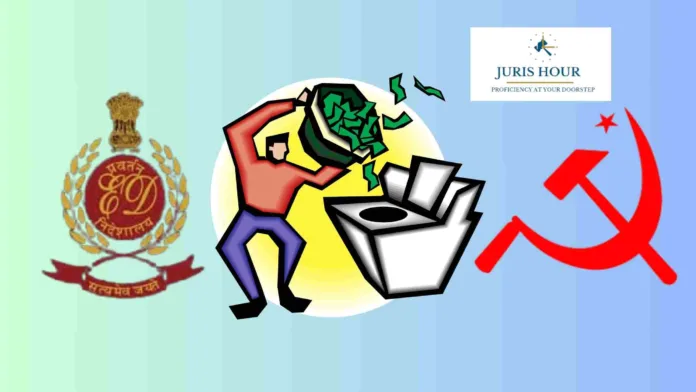Formally designating the Communist Party of India (Marxist) [CPI(M)] in a prominent money laundering case involving the Karuvannur Co-operative Bank, the Enforcement Directorate (ED) has alleged financial irregularities to the tune of Rs 180 crore.
Only the second time a political party in India has been officially charged under the Prevention of Money Laundering Act (PMLA), first the Aam Aadmi Party in reference to the Delhi excise policy probe.
What the ED claims
Multiple CPI(M) leaders directly helped to enable fraudulent loans through the Thrissur-based Karuvannur Co-operative Bank, according to the ED’s chargesheet. According to the investigating agency:
Benami accounts were used to provide fake loans.
Money was directed to the party’s local affiliate for political campaigning.
Leading party officials knew of and were involved in the illicit deals.
Among those named in the report are notable CPI(M) figures such as Lok Sabha MP K Radhakrishnan, MLA and former minister A C Moideen, and former district secretary M M Varghese.
Biju M K, a former bank employee turned state witness, revealed that party district committees typically affected loan disbursements and took cutoffs of the money for political use.
Magnitude of the Fraud
According to the ED, the scheme cost almost ₹180 crore. Already linked in the probe are assets valued at ₹128 crore. With this fresh chargesheet, the total number of people charged in the case has risen to 83.
CPI(M)’s response
State secretary M V Govindan rejected any party misbehavior and declared that internal disciplinary action had already been done against those implicated in the operations of the bank.
He also accused the ED of targeting opposition parties as part of a broader plan to weaken regional voices ahead of elections.
Political Repercussion and Opposition
Accusing both the BJP and CPI(M) of collusion, the Congress cites the absence of well-known arrests as proof of a clandestine political agreement. Meanwhile, the BJP has embraced the ED’s initiative and given credit to Union Minister Suresh Gopi for lobbying government to assist upset depositors.
Background: What is the Karuvannur Scam?
The scam, discovered in 2021, claimed that Karuvannur Co-operative Bank in Thrissur had significant loan issuing anomalies. Some loans were approved without collateral to people using fictitious identities. Local CPI(M) leaders supervised or affected the process, the ED claims, thereby transforming the bank into a financial center for laundering black money.
What’s Next?
Ahead of future elections, the case is likely to increase political intensity in Kerala. Given that the CPI(M) as well as the Aam Aadmi Party are now caught in ED-led probes, the argument over the use of central agencies for political goals is probably going to become more intense.
Read More: India’s proposed tariffs on 29 American goods are opposed by the US at the WTO

